Google UK: Organisational Behaviour, Motivation Theories & Teamwork
VerifiedAdded on 2023/06/17
|14
|4762
|391
Report
AI Summary
This report provides an analysis of organisational behaviour within Google UK, examining the impact of company culture, politics, and power on both individual and team performance. It delves into Handy's model of organisational culture, highlighting power, role, and person cultures, and evaluates the influence of different forms of power, such as coercive and reward power, on employee behaviour. The report also assesses the role of organisational politics, both positive and negative, in shaping employee satisfaction and productivity. Furthermore, it explores process and content motivation theories, focusing on Adam's Equity Theory and Maslow's Hierarchy of Needs, to understand how these theories assist Google UK in achieving its objectives by motivating employees. Finally, the report contrasts effective and ineffective teams, considering factors like goals, leadership, and team development, with reference to Tuckman's team development theory.
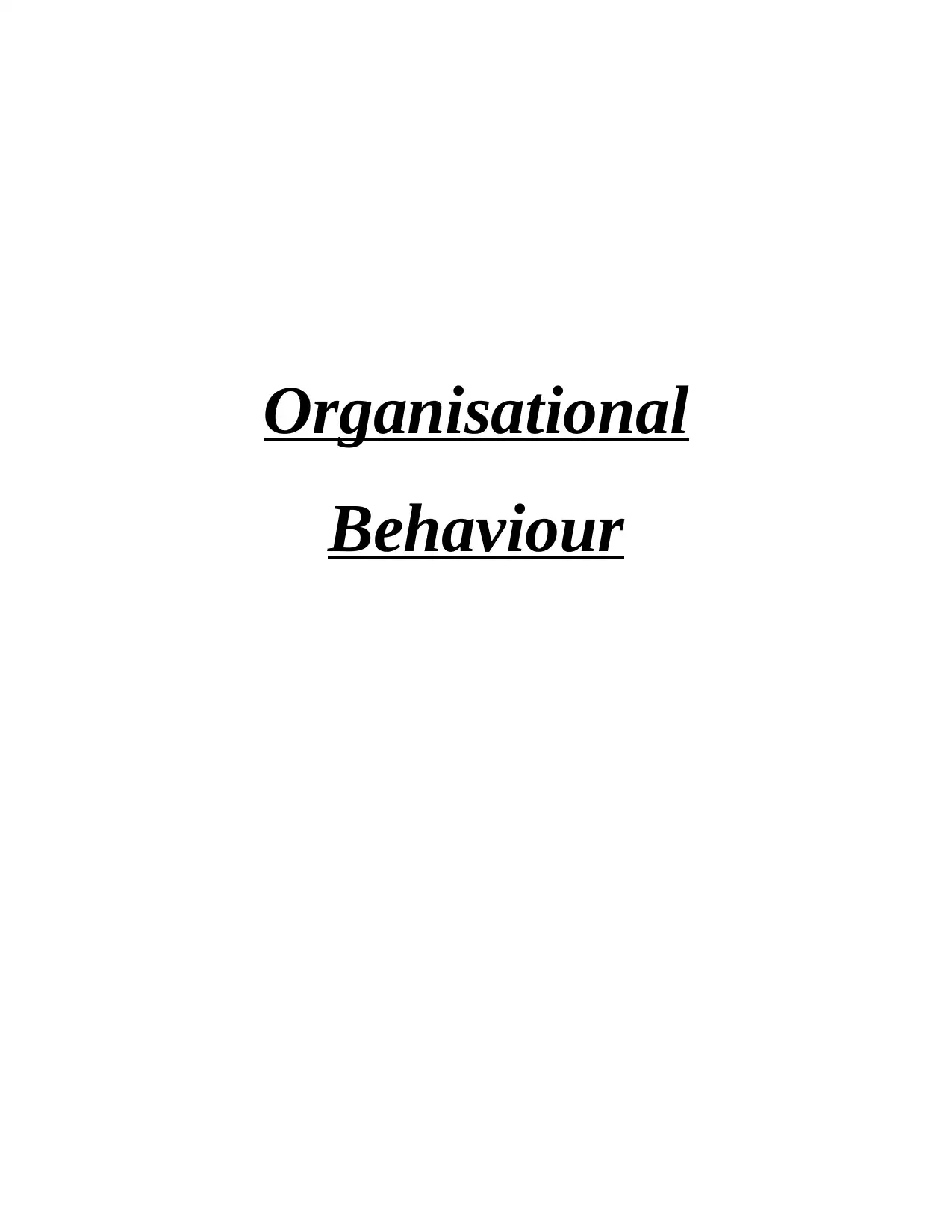
Organisational
Behaviour
Behaviour
Paraphrase This Document
Need a fresh take? Get an instant paraphrase of this document with our AI Paraphraser
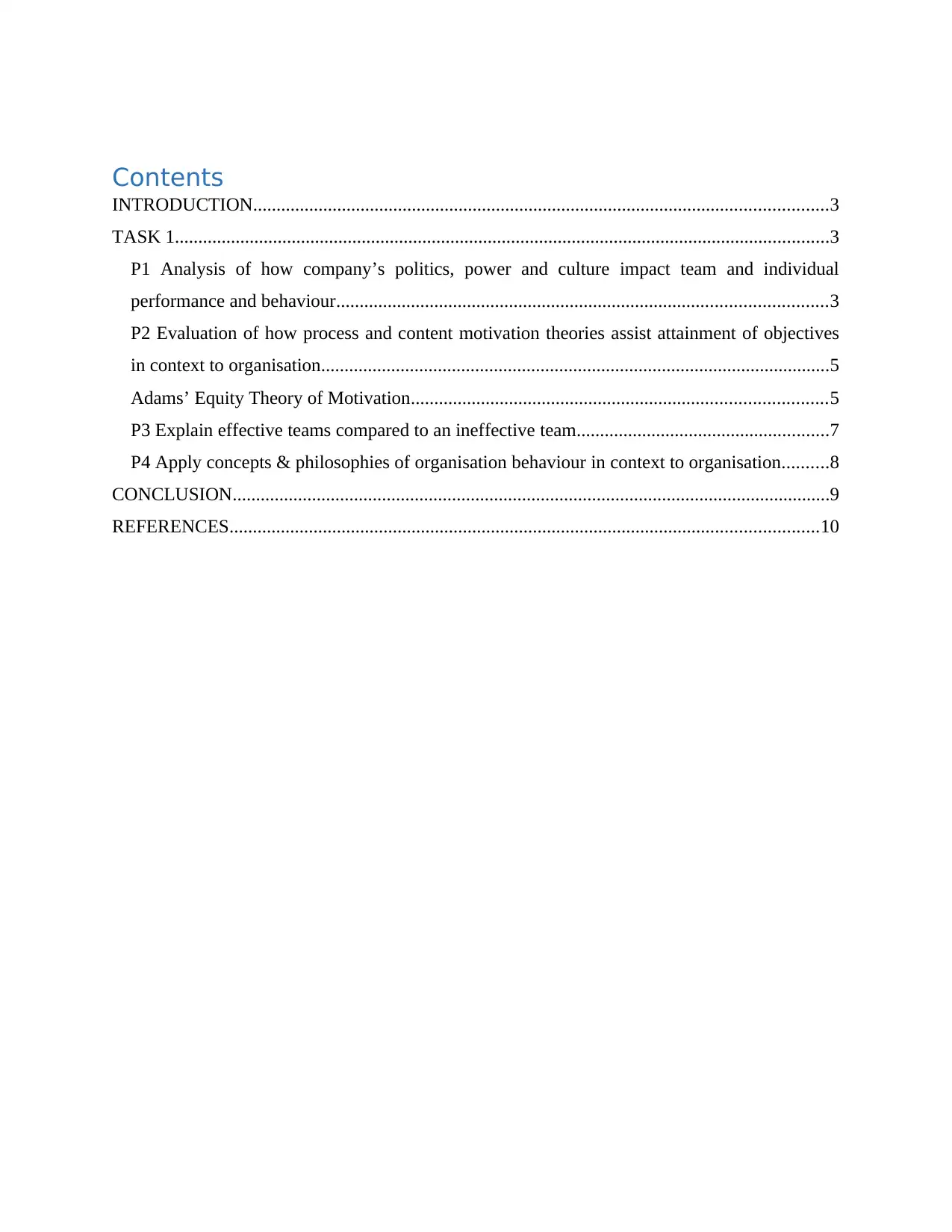
Contents
INTRODUCTION...........................................................................................................................3
TASK 1............................................................................................................................................3
P1 Analysis of how company’s politics, power and culture impact team and individual
performance and behaviour.........................................................................................................3
P2 Evaluation of how process and content motivation theories assist attainment of objectives
in context to organisation.............................................................................................................5
Adams’ Equity Theory of Motivation.........................................................................................5
P3 Explain effective teams compared to an ineffective team......................................................7
P4 Apply concepts & philosophies of organisation behaviour in context to organisation..........8
CONCLUSION................................................................................................................................9
REFERENCES..............................................................................................................................10
INTRODUCTION...........................................................................................................................3
TASK 1............................................................................................................................................3
P1 Analysis of how company’s politics, power and culture impact team and individual
performance and behaviour.........................................................................................................3
P2 Evaluation of how process and content motivation theories assist attainment of objectives
in context to organisation.............................................................................................................5
Adams’ Equity Theory of Motivation.........................................................................................5
P3 Explain effective teams compared to an ineffective team......................................................7
P4 Apply concepts & philosophies of organisation behaviour in context to organisation..........8
CONCLUSION................................................................................................................................9
REFERENCES..............................................................................................................................10
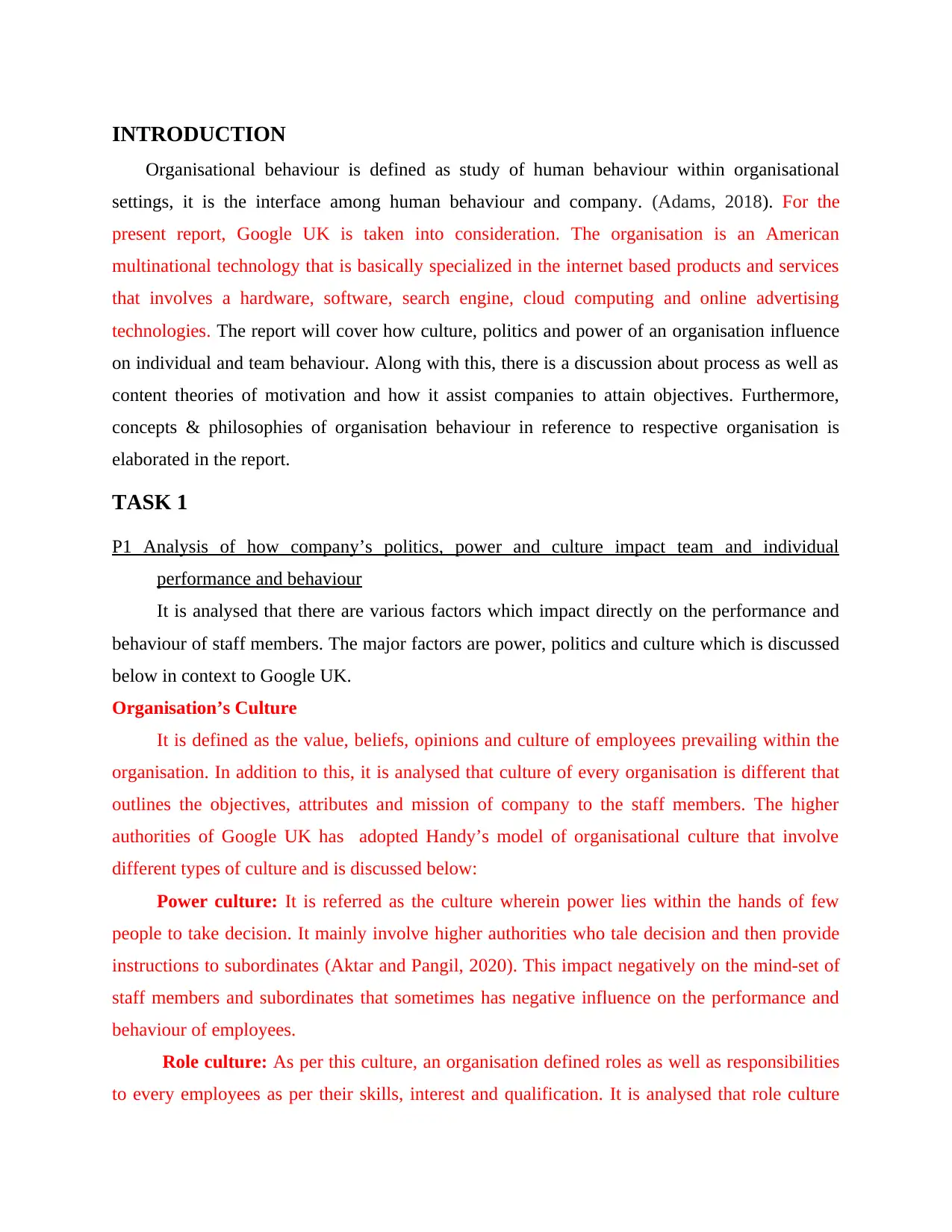
INTRODUCTION
Organisational behaviour is defined as study of human behaviour within organisational
settings, it is the interface among human behaviour and company. (Adams, 2018). For the
present report, Google UK is taken into consideration. The organisation is an American
multinational technology that is basically specialized in the internet based products and services
that involves a hardware, software, search engine, cloud computing and online advertising
technologies. The report will cover how culture, politics and power of an organisation influence
on individual and team behaviour. Along with this, there is a discussion about process as well as
content theories of motivation and how it assist companies to attain objectives. Furthermore,
concepts & philosophies of organisation behaviour in reference to respective organisation is
elaborated in the report.
TASK 1
P1 Analysis of how company’s politics, power and culture impact team and individual
performance and behaviour
It is analysed that there are various factors which impact directly on the performance and
behaviour of staff members. The major factors are power, politics and culture which is discussed
below in context to Google UK.
Organisation’s Culture
It is defined as the value, beliefs, opinions and culture of employees prevailing within the
organisation. In addition to this, it is analysed that culture of every organisation is different that
outlines the objectives, attributes and mission of company to the staff members. The higher
authorities of Google UK has adopted Handy’s model of organisational culture that involve
different types of culture and is discussed below:
Power culture: It is referred as the culture wherein power lies within the hands of few
people to take decision. It mainly involve higher authorities who tale decision and then provide
instructions to subordinates (Aktar and Pangil, 2020). This impact negatively on the mind-set of
staff members and subordinates that sometimes has negative influence on the performance and
behaviour of employees.
Role culture: As per this culture, an organisation defined roles as well as responsibilities
to every employees as per their skills, interest and qualification. It is analysed that role culture
Organisational behaviour is defined as study of human behaviour within organisational
settings, it is the interface among human behaviour and company. (Adams, 2018). For the
present report, Google UK is taken into consideration. The organisation is an American
multinational technology that is basically specialized in the internet based products and services
that involves a hardware, software, search engine, cloud computing and online advertising
technologies. The report will cover how culture, politics and power of an organisation influence
on individual and team behaviour. Along with this, there is a discussion about process as well as
content theories of motivation and how it assist companies to attain objectives. Furthermore,
concepts & philosophies of organisation behaviour in reference to respective organisation is
elaborated in the report.
TASK 1
P1 Analysis of how company’s politics, power and culture impact team and individual
performance and behaviour
It is analysed that there are various factors which impact directly on the performance and
behaviour of staff members. The major factors are power, politics and culture which is discussed
below in context to Google UK.
Organisation’s Culture
It is defined as the value, beliefs, opinions and culture of employees prevailing within the
organisation. In addition to this, it is analysed that culture of every organisation is different that
outlines the objectives, attributes and mission of company to the staff members. The higher
authorities of Google UK has adopted Handy’s model of organisational culture that involve
different types of culture and is discussed below:
Power culture: It is referred as the culture wherein power lies within the hands of few
people to take decision. It mainly involve higher authorities who tale decision and then provide
instructions to subordinates (Aktar and Pangil, 2020). This impact negatively on the mind-set of
staff members and subordinates that sometimes has negative influence on the performance and
behaviour of employees.
Role culture: As per this culture, an organisation defined roles as well as responsibilities
to every employees as per their skills, interest and qualification. It is analysed that role culture
⊘ This is a preview!⊘
Do you want full access?
Subscribe today to unlock all pages.

Trusted by 1+ million students worldwide
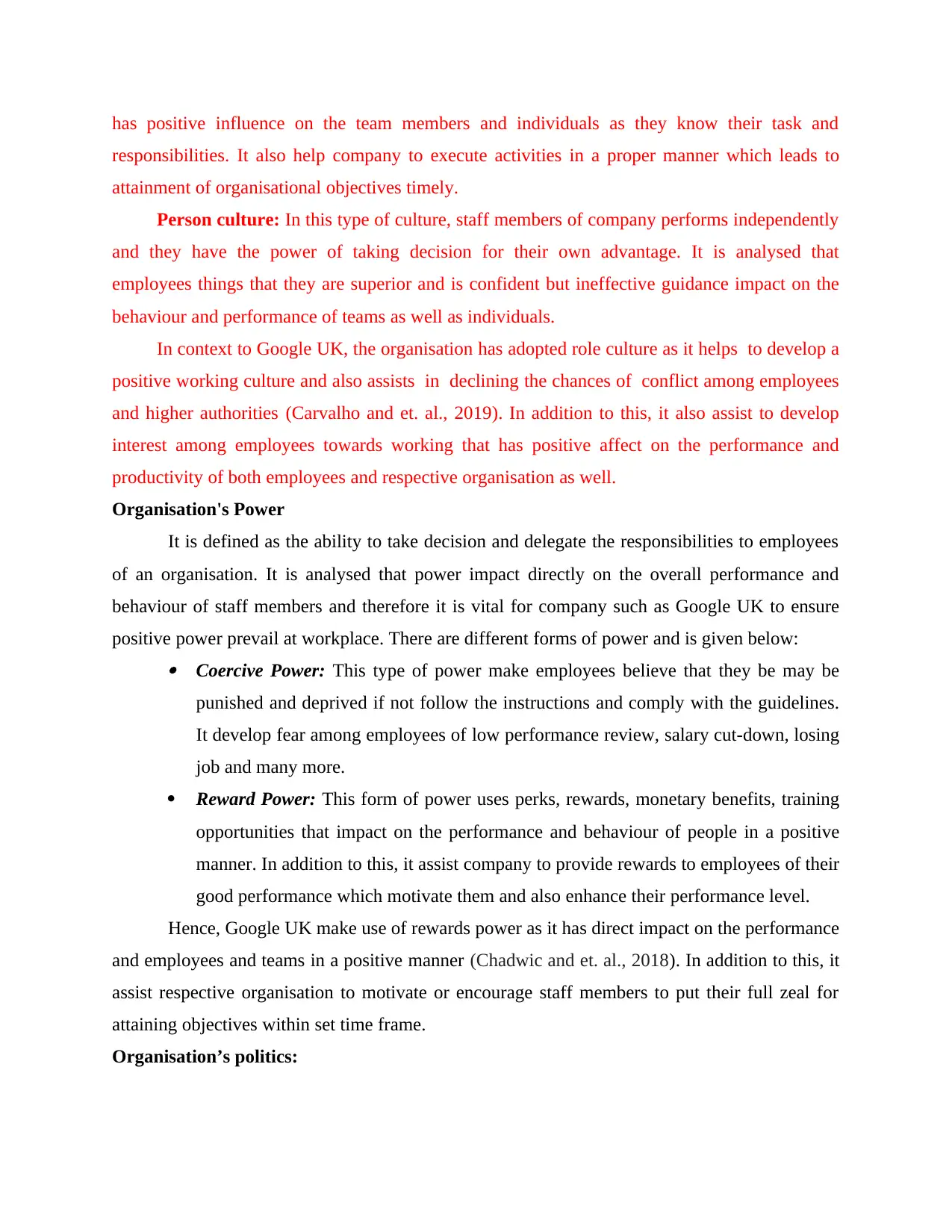
has positive influence on the team members and individuals as they know their task and
responsibilities. It also help company to execute activities in a proper manner which leads to
attainment of organisational objectives timely.
Person culture: In this type of culture, staff members of company performs independently
and they have the power of taking decision for their own advantage. It is analysed that
employees things that they are superior and is confident but ineffective guidance impact on the
behaviour and performance of teams as well as individuals.
In context to Google UK, the organisation has adopted role culture as it helps to develop a
positive working culture and also assists in declining the chances of conflict among employees
and higher authorities (Carvalho and et. al., 2019). In addition to this, it also assist to develop
interest among employees towards working that has positive affect on the performance and
productivity of both employees and respective organisation as well.
Organisation's Power
It is defined as the ability to take decision and delegate the responsibilities to employees
of an organisation. It is analysed that power impact directly on the overall performance and
behaviour of staff members and therefore it is vital for company such as Google UK to ensure
positive power prevail at workplace. There are different forms of power and is given below:
Coercive Power: This type of power make employees believe that they be may be
punished and deprived if not follow the instructions and comply with the guidelines.
It develop fear among employees of low performance review, salary cut-down, losing
job and many more.
Reward Power: This form of power uses perks, rewards, monetary benefits, training
opportunities that impact on the performance and behaviour of people in a positive
manner. In addition to this, it assist company to provide rewards to employees of their
good performance which motivate them and also enhance their performance level.
Hence, Google UK make use of rewards power as it has direct impact on the performance
and employees and teams in a positive manner (Chadwic and et. al., 2018). In addition to this, it
assist respective organisation to motivate or encourage staff members to put their full zeal for
attaining objectives within set time frame.
Organisation’s politics:
responsibilities. It also help company to execute activities in a proper manner which leads to
attainment of organisational objectives timely.
Person culture: In this type of culture, staff members of company performs independently
and they have the power of taking decision for their own advantage. It is analysed that
employees things that they are superior and is confident but ineffective guidance impact on the
behaviour and performance of teams as well as individuals.
In context to Google UK, the organisation has adopted role culture as it helps to develop a
positive working culture and also assists in declining the chances of conflict among employees
and higher authorities (Carvalho and et. al., 2019). In addition to this, it also assist to develop
interest among employees towards working that has positive affect on the performance and
productivity of both employees and respective organisation as well.
Organisation's Power
It is defined as the ability to take decision and delegate the responsibilities to employees
of an organisation. It is analysed that power impact directly on the overall performance and
behaviour of staff members and therefore it is vital for company such as Google UK to ensure
positive power prevail at workplace. There are different forms of power and is given below:
Coercive Power: This type of power make employees believe that they be may be
punished and deprived if not follow the instructions and comply with the guidelines.
It develop fear among employees of low performance review, salary cut-down, losing
job and many more.
Reward Power: This form of power uses perks, rewards, monetary benefits, training
opportunities that impact on the performance and behaviour of people in a positive
manner. In addition to this, it assist company to provide rewards to employees of their
good performance which motivate them and also enhance their performance level.
Hence, Google UK make use of rewards power as it has direct impact on the performance
and employees and teams in a positive manner (Chadwic and et. al., 2018). In addition to this, it
assist respective organisation to motivate or encourage staff members to put their full zeal for
attaining objectives within set time frame.
Organisation’s politics:
Paraphrase This Document
Need a fresh take? Get an instant paraphrase of this document with our AI Paraphraser
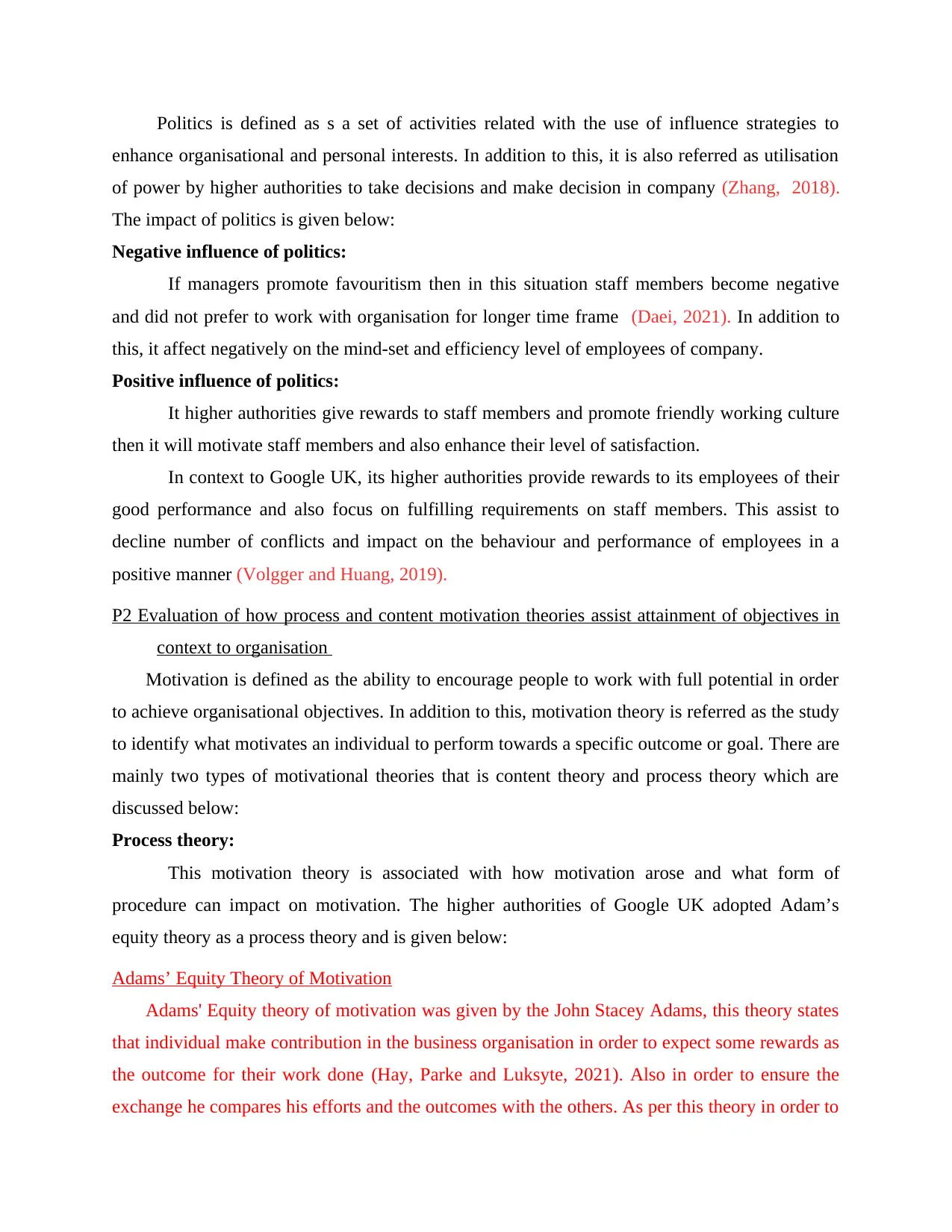
Politics is defined as s a set of activities related with the use of influence strategies to
enhance organisational and personal interests. In addition to this, it is also referred as utilisation
of power by higher authorities to take decisions and make decision in company (Zhang, 2018).
The impact of politics is given below:
Negative influence of politics:
If managers promote favouritism then in this situation staff members become negative
and did not prefer to work with organisation for longer time frame (Daei, 2021). In addition to
this, it affect negatively on the mind-set and efficiency level of employees of company.
Positive influence of politics:
It higher authorities give rewards to staff members and promote friendly working culture
then it will motivate staff members and also enhance their level of satisfaction.
In context to Google UK, its higher authorities provide rewards to its employees of their
good performance and also focus on fulfilling requirements on staff members. This assist to
decline number of conflicts and impact on the behaviour and performance of employees in a
positive manner (Volgger and Huang, 2019).
P2 Evaluation of how process and content motivation theories assist attainment of objectives in
context to organisation
Motivation is defined as the ability to encourage people to work with full potential in order
to achieve organisational objectives. In addition to this, motivation theory is referred as the study
to identify what motivates an individual to perform towards a specific outcome or goal. There are
mainly two types of motivational theories that is content theory and process theory which are
discussed below:
Process theory:
This motivation theory is associated with how motivation arose and what form of
procedure can impact on motivation. The higher authorities of Google UK adopted Adam’s
equity theory as a process theory and is given below:
Adams’ Equity Theory of Motivation
Adams' Equity theory of motivation was given by the John Stacey Adams, this theory states
that individual make contribution in the business organisation in order to expect some rewards as
the outcome for their work done (Hay, Parke and Luksyte, 2021). Also in order to ensure the
exchange he compares his efforts and the outcomes with the others. As per this theory in order to
enhance organisational and personal interests. In addition to this, it is also referred as utilisation
of power by higher authorities to take decisions and make decision in company (Zhang, 2018).
The impact of politics is given below:
Negative influence of politics:
If managers promote favouritism then in this situation staff members become negative
and did not prefer to work with organisation for longer time frame (Daei, 2021). In addition to
this, it affect negatively on the mind-set and efficiency level of employees of company.
Positive influence of politics:
It higher authorities give rewards to staff members and promote friendly working culture
then it will motivate staff members and also enhance their level of satisfaction.
In context to Google UK, its higher authorities provide rewards to its employees of their
good performance and also focus on fulfilling requirements on staff members. This assist to
decline number of conflicts and impact on the behaviour and performance of employees in a
positive manner (Volgger and Huang, 2019).
P2 Evaluation of how process and content motivation theories assist attainment of objectives in
context to organisation
Motivation is defined as the ability to encourage people to work with full potential in order
to achieve organisational objectives. In addition to this, motivation theory is referred as the study
to identify what motivates an individual to perform towards a specific outcome or goal. There are
mainly two types of motivational theories that is content theory and process theory which are
discussed below:
Process theory:
This motivation theory is associated with how motivation arose and what form of
procedure can impact on motivation. The higher authorities of Google UK adopted Adam’s
equity theory as a process theory and is given below:
Adams’ Equity Theory of Motivation
Adams' Equity theory of motivation was given by the John Stacey Adams, this theory states
that individual make contribution in the business organisation in order to expect some rewards as
the outcome for their work done (Hay, Parke and Luksyte, 2021). Also in order to ensure the
exchange he compares his efforts and the outcomes with the others. As per this theory in order to
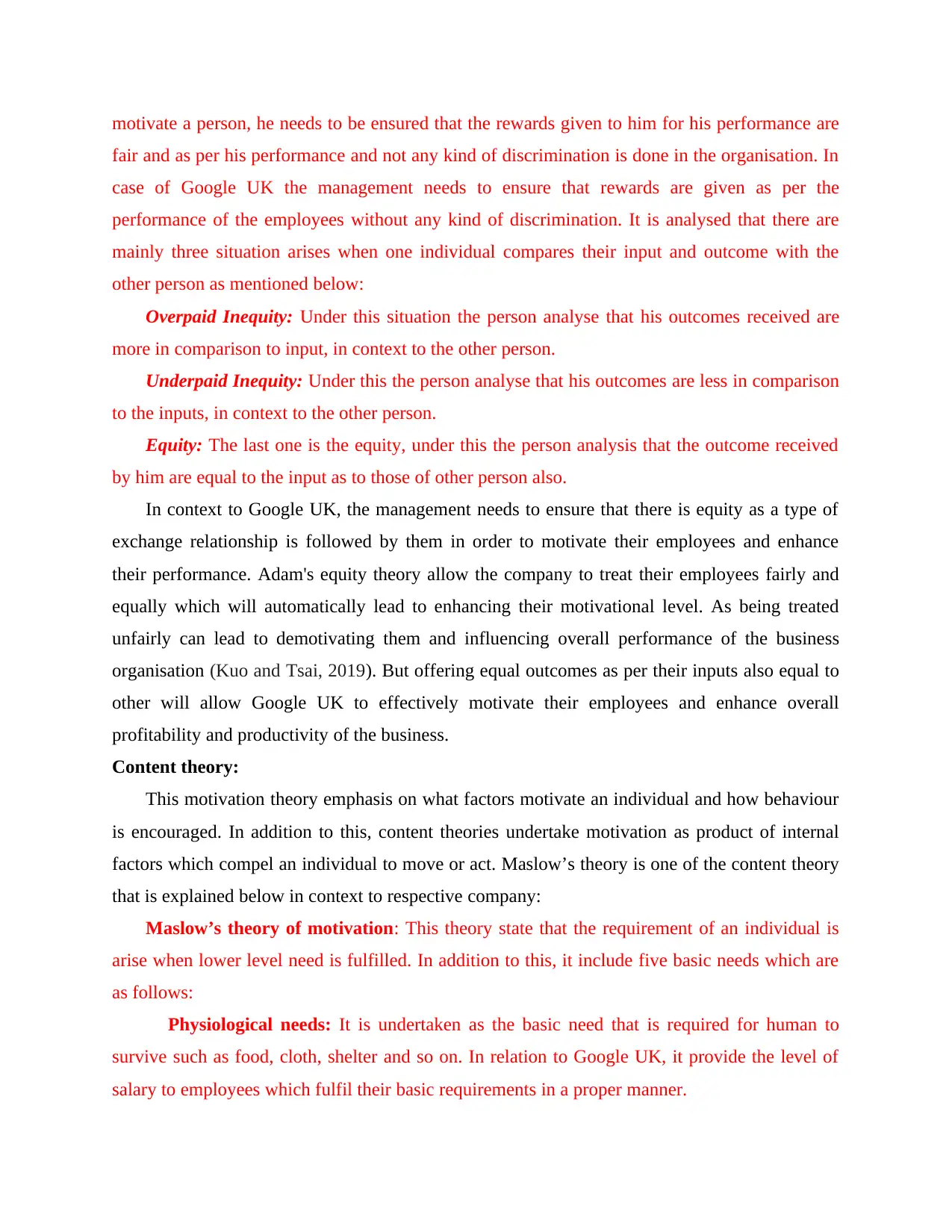
motivate a person, he needs to be ensured that the rewards given to him for his performance are
fair and as per his performance and not any kind of discrimination is done in the organisation. In
case of Google UK the management needs to ensure that rewards are given as per the
performance of the employees without any kind of discrimination. It is analysed that there are
mainly three situation arises when one individual compares their input and outcome with the
other person as mentioned below:
Overpaid Inequity: Under this situation the person analyse that his outcomes received are
more in comparison to input, in context to the other person.
Underpaid Inequity: Under this the person analyse that his outcomes are less in comparison
to the inputs, in context to the other person.
Equity: The last one is the equity, under this the person analysis that the outcome received
by him are equal to the input as to those of other person also.
In context to Google UK, the management needs to ensure that there is equity as a type of
exchange relationship is followed by them in order to motivate their employees and enhance
their performance. Adam's equity theory allow the company to treat their employees fairly and
equally which will automatically lead to enhancing their motivational level. As being treated
unfairly can lead to demotivating them and influencing overall performance of the business
organisation (Kuo and Tsai, 2019). But offering equal outcomes as per their inputs also equal to
other will allow Google UK to effectively motivate their employees and enhance overall
profitability and productivity of the business.
Content theory:
This motivation theory emphasis on what factors motivate an individual and how behaviour
is encouraged. In addition to this, content theories undertake motivation as product of internal
factors which compel an individual to move or act. Maslow’s theory is one of the content theory
that is explained below in context to respective company:
Maslow’s theory of motivation: This theory state that the requirement of an individual is
arise when lower level need is fulfilled. In addition to this, it include five basic needs which are
as follows:
Physiological needs: It is undertaken as the basic need that is required for human to
survive such as food, cloth, shelter and so on. In relation to Google UK, it provide the level of
salary to employees which fulfil their basic requirements in a proper manner.
fair and as per his performance and not any kind of discrimination is done in the organisation. In
case of Google UK the management needs to ensure that rewards are given as per the
performance of the employees without any kind of discrimination. It is analysed that there are
mainly three situation arises when one individual compares their input and outcome with the
other person as mentioned below:
Overpaid Inequity: Under this situation the person analyse that his outcomes received are
more in comparison to input, in context to the other person.
Underpaid Inequity: Under this the person analyse that his outcomes are less in comparison
to the inputs, in context to the other person.
Equity: The last one is the equity, under this the person analysis that the outcome received
by him are equal to the input as to those of other person also.
In context to Google UK, the management needs to ensure that there is equity as a type of
exchange relationship is followed by them in order to motivate their employees and enhance
their performance. Adam's equity theory allow the company to treat their employees fairly and
equally which will automatically lead to enhancing their motivational level. As being treated
unfairly can lead to demotivating them and influencing overall performance of the business
organisation (Kuo and Tsai, 2019). But offering equal outcomes as per their inputs also equal to
other will allow Google UK to effectively motivate their employees and enhance overall
profitability and productivity of the business.
Content theory:
This motivation theory emphasis on what factors motivate an individual and how behaviour
is encouraged. In addition to this, content theories undertake motivation as product of internal
factors which compel an individual to move or act. Maslow’s theory is one of the content theory
that is explained below in context to respective company:
Maslow’s theory of motivation: This theory state that the requirement of an individual is
arise when lower level need is fulfilled. In addition to this, it include five basic needs which are
as follows:
Physiological needs: It is undertaken as the basic need that is required for human to
survive such as food, cloth, shelter and so on. In relation to Google UK, it provide the level of
salary to employees which fulfil their basic requirements in a proper manner.
⊘ This is a preview!⊘
Do you want full access?
Subscribe today to unlock all pages.

Trusted by 1+ million students worldwide
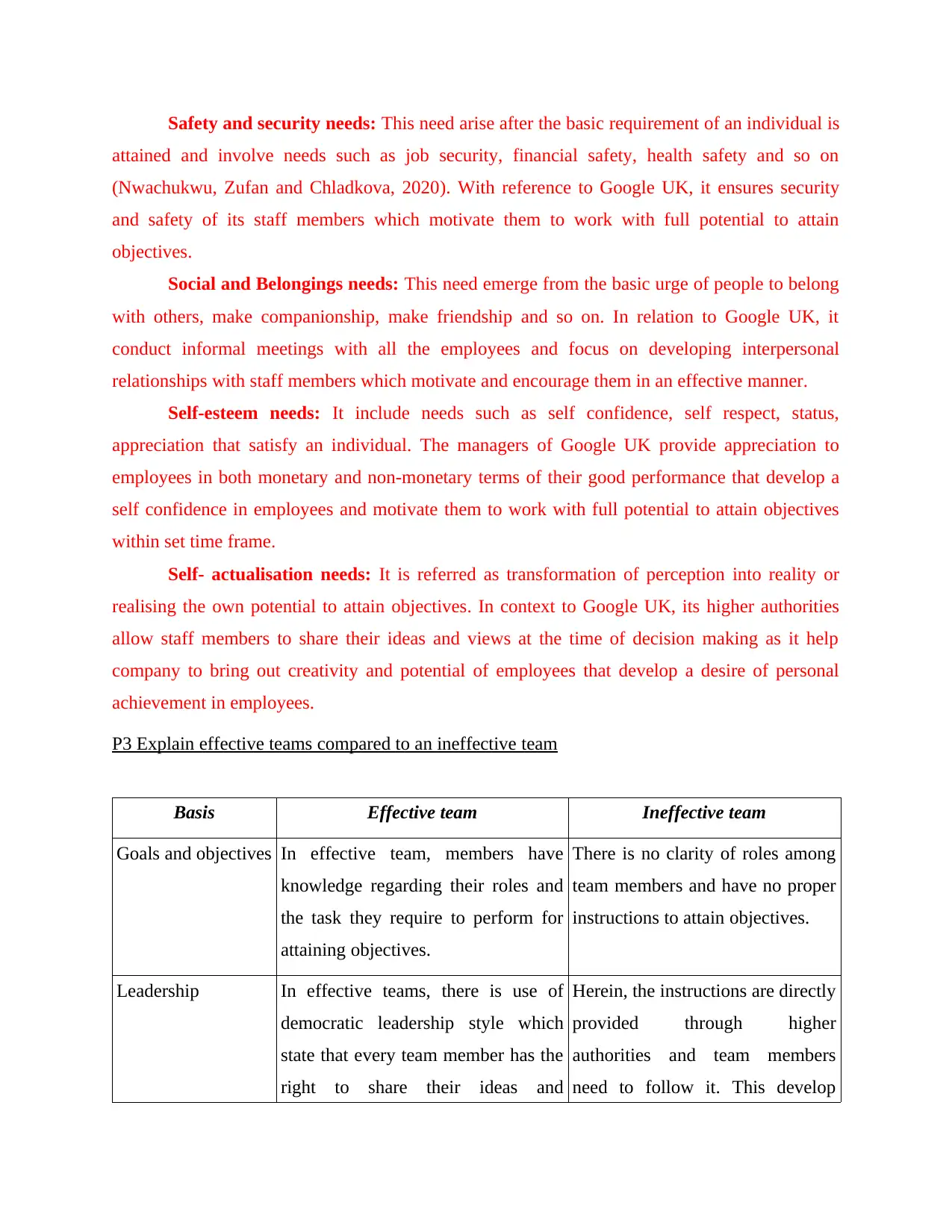
Safety and security needs: This need arise after the basic requirement of an individual is
attained and involve needs such as job security, financial safety, health safety and so on
(Nwachukwu, Zufan and Chladkova, 2020). With reference to Google UK, it ensures security
and safety of its staff members which motivate them to work with full potential to attain
objectives.
Social and Belongings needs: This need emerge from the basic urge of people to belong
with others, make companionship, make friendship and so on. In relation to Google UK, it
conduct informal meetings with all the employees and focus on developing interpersonal
relationships with staff members which motivate and encourage them in an effective manner.
Self-esteem needs: It include needs such as self confidence, self respect, status,
appreciation that satisfy an individual. The managers of Google UK provide appreciation to
employees in both monetary and non-monetary terms of their good performance that develop a
self confidence in employees and motivate them to work with full potential to attain objectives
within set time frame.
Self- actualisation needs: It is referred as transformation of perception into reality or
realising the own potential to attain objectives. In context to Google UK, its higher authorities
allow staff members to share their ideas and views at the time of decision making as it help
company to bring out creativity and potential of employees that develop a desire of personal
achievement in employees.
P3 Explain effective teams compared to an ineffective team
Basis Effective team Ineffective team
Goals and objectives In effective team, members have
knowledge regarding their roles and
the task they require to perform for
attaining objectives.
There is no clarity of roles among
team members and have no proper
instructions to attain objectives.
Leadership In effective teams, there is use of
democratic leadership style which
state that every team member has the
right to share their ideas and
Herein, the instructions are directly
provided through higher
authorities and team members
need to follow it. This develop
attained and involve needs such as job security, financial safety, health safety and so on
(Nwachukwu, Zufan and Chladkova, 2020). With reference to Google UK, it ensures security
and safety of its staff members which motivate them to work with full potential to attain
objectives.
Social and Belongings needs: This need emerge from the basic urge of people to belong
with others, make companionship, make friendship and so on. In relation to Google UK, it
conduct informal meetings with all the employees and focus on developing interpersonal
relationships with staff members which motivate and encourage them in an effective manner.
Self-esteem needs: It include needs such as self confidence, self respect, status,
appreciation that satisfy an individual. The managers of Google UK provide appreciation to
employees in both monetary and non-monetary terms of their good performance that develop a
self confidence in employees and motivate them to work with full potential to attain objectives
within set time frame.
Self- actualisation needs: It is referred as transformation of perception into reality or
realising the own potential to attain objectives. In context to Google UK, its higher authorities
allow staff members to share their ideas and views at the time of decision making as it help
company to bring out creativity and potential of employees that develop a desire of personal
achievement in employees.
P3 Explain effective teams compared to an ineffective team
Basis Effective team Ineffective team
Goals and objectives In effective team, members have
knowledge regarding their roles and
the task they require to perform for
attaining objectives.
There is no clarity of roles among
team members and have no proper
instructions to attain objectives.
Leadership In effective teams, there is use of
democratic leadership style which
state that every team member has the
right to share their ideas and
Herein, the instructions are directly
provided through higher
authorities and team members
need to follow it. This develop
Paraphrase This Document
Need a fresh take? Get an instant paraphrase of this document with our AI Paraphraser
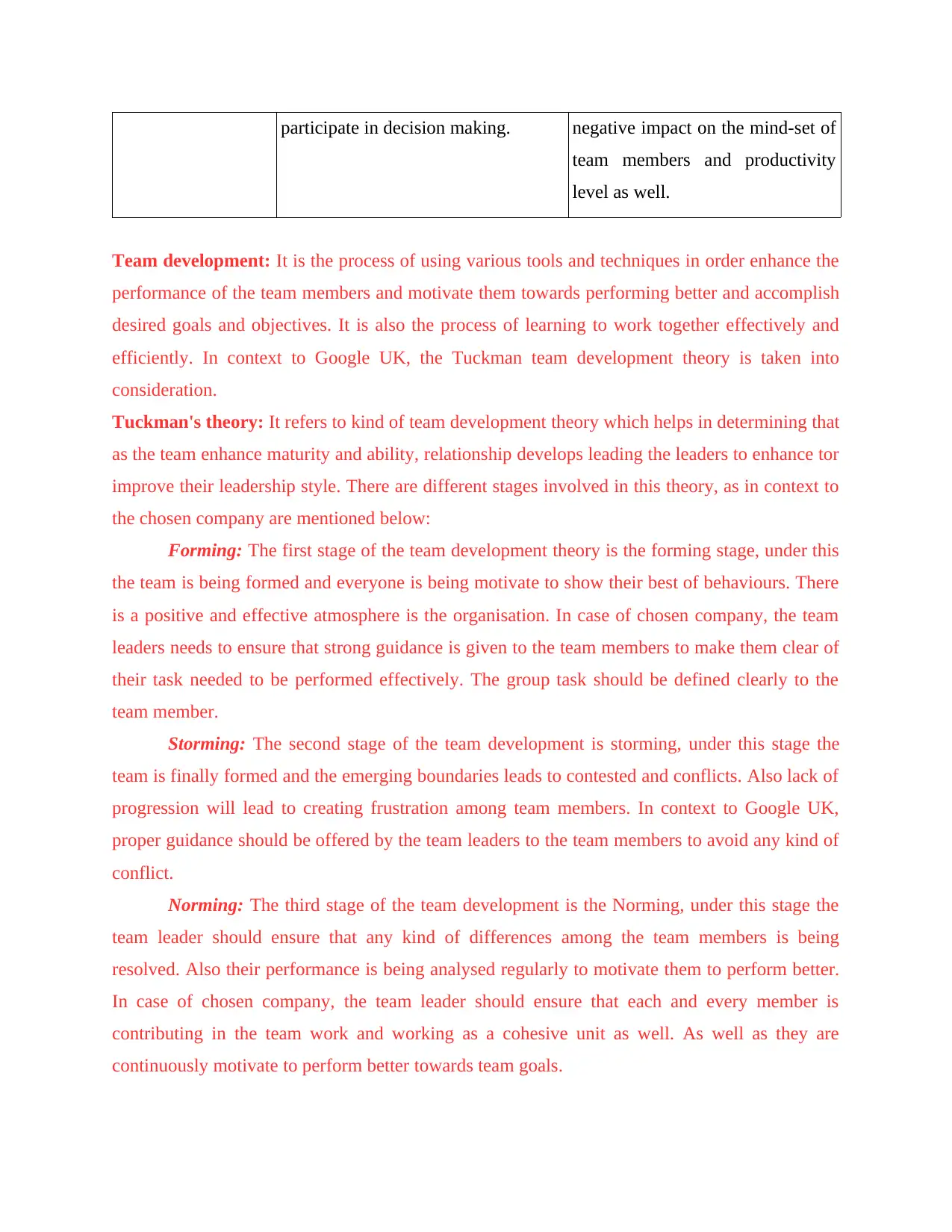
participate in decision making. negative impact on the mind-set of
team members and productivity
level as well.
Team development: It is the process of using various tools and techniques in order enhance the
performance of the team members and motivate them towards performing better and accomplish
desired goals and objectives. It is also the process of learning to work together effectively and
efficiently. In context to Google UK, the Tuckman team development theory is taken into
consideration.
Tuckman's theory: It refers to kind of team development theory which helps in determining that
as the team enhance maturity and ability, relationship develops leading the leaders to enhance tor
improve their leadership style. There are different stages involved in this theory, as in context to
the chosen company are mentioned below:
Forming: The first stage of the team development theory is the forming stage, under this
the team is being formed and everyone is being motivate to show their best of behaviours. There
is a positive and effective atmosphere is the organisation. In case of chosen company, the team
leaders needs to ensure that strong guidance is given to the team members to make them clear of
their task needed to be performed effectively. The group task should be defined clearly to the
team member.
Storming: The second stage of the team development is storming, under this stage the
team is finally formed and the emerging boundaries leads to contested and conflicts. Also lack of
progression will lead to creating frustration among team members. In context to Google UK,
proper guidance should be offered by the team leaders to the team members to avoid any kind of
conflict.
Norming: The third stage of the team development is the Norming, under this stage the
team leader should ensure that any kind of differences among the team members is being
resolved. Also their performance is being analysed regularly to motivate them to perform better.
In case of chosen company, the team leader should ensure that each and every member is
contributing in the team work and working as a cohesive unit as well. As well as they are
continuously motivate to perform better towards team goals.
team members and productivity
level as well.
Team development: It is the process of using various tools and techniques in order enhance the
performance of the team members and motivate them towards performing better and accomplish
desired goals and objectives. It is also the process of learning to work together effectively and
efficiently. In context to Google UK, the Tuckman team development theory is taken into
consideration.
Tuckman's theory: It refers to kind of team development theory which helps in determining that
as the team enhance maturity and ability, relationship develops leading the leaders to enhance tor
improve their leadership style. There are different stages involved in this theory, as in context to
the chosen company are mentioned below:
Forming: The first stage of the team development theory is the forming stage, under this
the team is being formed and everyone is being motivate to show their best of behaviours. There
is a positive and effective atmosphere is the organisation. In case of chosen company, the team
leaders needs to ensure that strong guidance is given to the team members to make them clear of
their task needed to be performed effectively. The group task should be defined clearly to the
team member.
Storming: The second stage of the team development is storming, under this stage the
team is finally formed and the emerging boundaries leads to contested and conflicts. Also lack of
progression will lead to creating frustration among team members. In context to Google UK,
proper guidance should be offered by the team leaders to the team members to avoid any kind of
conflict.
Norming: The third stage of the team development is the Norming, under this stage the
team leader should ensure that any kind of differences among the team members is being
resolved. Also their performance is being analysed regularly to motivate them to perform better.
In case of chosen company, the team leader should ensure that each and every member is
contributing in the team work and working as a cohesive unit as well. As well as they are
continuously motivate to perform better towards team goals.
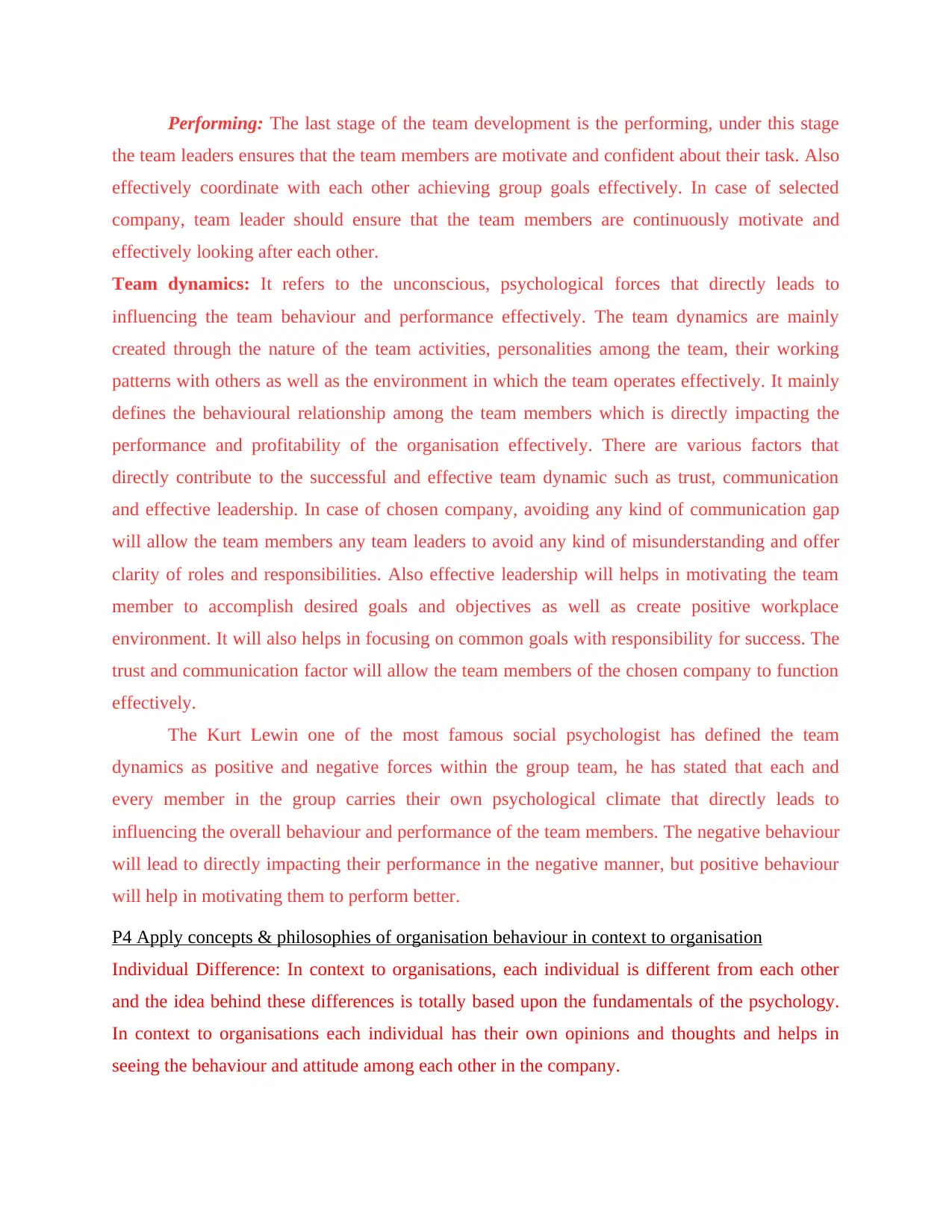
Performing: The last stage of the team development is the performing, under this stage
the team leaders ensures that the team members are motivate and confident about their task. Also
effectively coordinate with each other achieving group goals effectively. In case of selected
company, team leader should ensure that the team members are continuously motivate and
effectively looking after each other.
Team dynamics: It refers to the unconscious, psychological forces that directly leads to
influencing the team behaviour and performance effectively. The team dynamics are mainly
created through the nature of the team activities, personalities among the team, their working
patterns with others as well as the environment in which the team operates effectively. It mainly
defines the behavioural relationship among the team members which is directly impacting the
performance and profitability of the organisation effectively. There are various factors that
directly contribute to the successful and effective team dynamic such as trust, communication
and effective leadership. In case of chosen company, avoiding any kind of communication gap
will allow the team members any team leaders to avoid any kind of misunderstanding and offer
clarity of roles and responsibilities. Also effective leadership will helps in motivating the team
member to accomplish desired goals and objectives as well as create positive workplace
environment. It will also helps in focusing on common goals with responsibility for success. The
trust and communication factor will allow the team members of the chosen company to function
effectively.
The Kurt Lewin one of the most famous social psychologist has defined the team
dynamics as positive and negative forces within the group team, he has stated that each and
every member in the group carries their own psychological climate that directly leads to
influencing the overall behaviour and performance of the team members. The negative behaviour
will lead to directly impacting their performance in the negative manner, but positive behaviour
will help in motivating them to perform better.
P4 Apply concepts & philosophies of organisation behaviour in context to organisation
Individual Difference: In context to organisations, each individual is different from each other
and the idea behind these differences is totally based upon the fundamentals of the psychology.
In context to organisations each individual has their own opinions and thoughts and helps in
seeing the behaviour and attitude among each other in the company.
the team leaders ensures that the team members are motivate and confident about their task. Also
effectively coordinate with each other achieving group goals effectively. In case of selected
company, team leader should ensure that the team members are continuously motivate and
effectively looking after each other.
Team dynamics: It refers to the unconscious, psychological forces that directly leads to
influencing the team behaviour and performance effectively. The team dynamics are mainly
created through the nature of the team activities, personalities among the team, their working
patterns with others as well as the environment in which the team operates effectively. It mainly
defines the behavioural relationship among the team members which is directly impacting the
performance and profitability of the organisation effectively. There are various factors that
directly contribute to the successful and effective team dynamic such as trust, communication
and effective leadership. In case of chosen company, avoiding any kind of communication gap
will allow the team members any team leaders to avoid any kind of misunderstanding and offer
clarity of roles and responsibilities. Also effective leadership will helps in motivating the team
member to accomplish desired goals and objectives as well as create positive workplace
environment. It will also helps in focusing on common goals with responsibility for success. The
trust and communication factor will allow the team members of the chosen company to function
effectively.
The Kurt Lewin one of the most famous social psychologist has defined the team
dynamics as positive and negative forces within the group team, he has stated that each and
every member in the group carries their own psychological climate that directly leads to
influencing the overall behaviour and performance of the team members. The negative behaviour
will lead to directly impacting their performance in the negative manner, but positive behaviour
will help in motivating them to perform better.
P4 Apply concepts & philosophies of organisation behaviour in context to organisation
Individual Difference: In context to organisations, each individual is different from each other
and the idea behind these differences is totally based upon the fundamentals of the psychology.
In context to organisations each individual has their own opinions and thoughts and helps in
seeing the behaviour and attitude among each other in the company.
⊘ This is a preview!⊘
Do you want full access?
Subscribe today to unlock all pages.

Trusted by 1+ million students worldwide
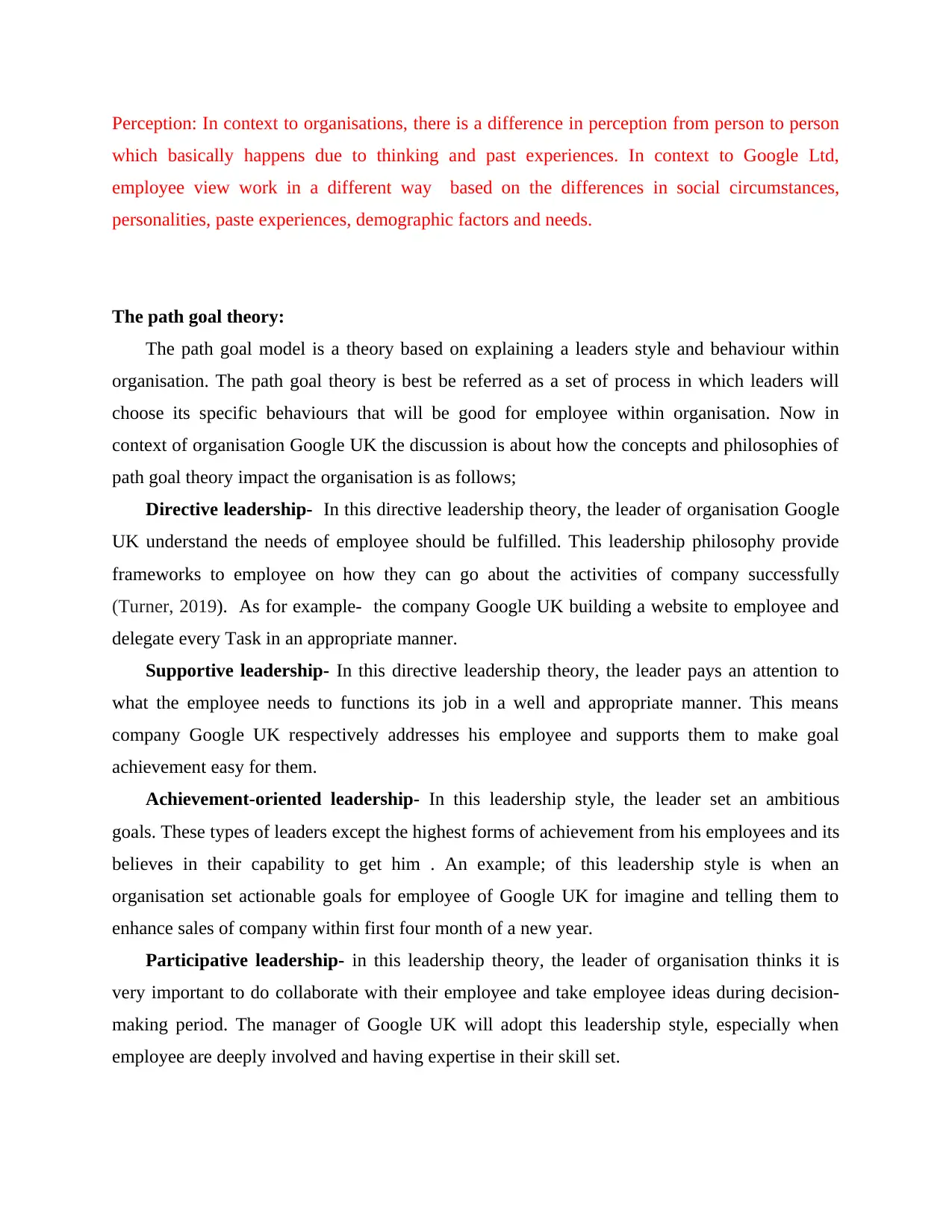
Perception: In context to organisations, there is a difference in perception from person to person
which basically happens due to thinking and past experiences. In context to Google Ltd,
employee view work in a different way based on the differences in social circumstances,
personalities, paste experiences, demographic factors and needs.
The path goal theory:
The path goal model is a theory based on explaining a leaders style and behaviour within
organisation. The path goal theory is best be referred as a set of process in which leaders will
choose its specific behaviours that will be good for employee within organisation. Now in
context of organisation Google UK the discussion is about how the concepts and philosophies of
path goal theory impact the organisation is as follows;
Directive leadership- In this directive leadership theory, the leader of organisation Google
UK understand the needs of employee should be fulfilled. This leadership philosophy provide
frameworks to employee on how they can go about the activities of company successfully
(Turner, 2019). As for example- the company Google UK building a website to employee and
delegate every Task in an appropriate manner.
Supportive leadership- In this directive leadership theory, the leader pays an attention to
what the employee needs to functions its job in a well and appropriate manner. This means
company Google UK respectively addresses his employee and supports them to make goal
achievement easy for them.
Achievement-oriented leadership- In this leadership style, the leader set an ambitious
goals. These types of leaders except the highest forms of achievement from his employees and its
believes in their capability to get him . An example; of this leadership style is when an
organisation set actionable goals for employee of Google UK for imagine and telling them to
enhance sales of company within first four month of a new year.
Participative leadership- in this leadership theory, the leader of organisation thinks it is
very important to do collaborate with their employee and take employee ideas during decision-
making period. The manager of Google UK will adopt this leadership style, especially when
employee are deeply involved and having expertise in their skill set.
which basically happens due to thinking and past experiences. In context to Google Ltd,
employee view work in a different way based on the differences in social circumstances,
personalities, paste experiences, demographic factors and needs.
The path goal theory:
The path goal model is a theory based on explaining a leaders style and behaviour within
organisation. The path goal theory is best be referred as a set of process in which leaders will
choose its specific behaviours that will be good for employee within organisation. Now in
context of organisation Google UK the discussion is about how the concepts and philosophies of
path goal theory impact the organisation is as follows;
Directive leadership- In this directive leadership theory, the leader of organisation Google
UK understand the needs of employee should be fulfilled. This leadership philosophy provide
frameworks to employee on how they can go about the activities of company successfully
(Turner, 2019). As for example- the company Google UK building a website to employee and
delegate every Task in an appropriate manner.
Supportive leadership- In this directive leadership theory, the leader pays an attention to
what the employee needs to functions its job in a well and appropriate manner. This means
company Google UK respectively addresses his employee and supports them to make goal
achievement easy for them.
Achievement-oriented leadership- In this leadership style, the leader set an ambitious
goals. These types of leaders except the highest forms of achievement from his employees and its
believes in their capability to get him . An example; of this leadership style is when an
organisation set actionable goals for employee of Google UK for imagine and telling them to
enhance sales of company within first four month of a new year.
Participative leadership- in this leadership theory, the leader of organisation thinks it is
very important to do collaborate with their employee and take employee ideas during decision-
making period. The manager of Google UK will adopt this leadership style, especially when
employee are deeply involved and having expertise in their skill set.
Paraphrase This Document
Need a fresh take? Get an instant paraphrase of this document with our AI Paraphraser
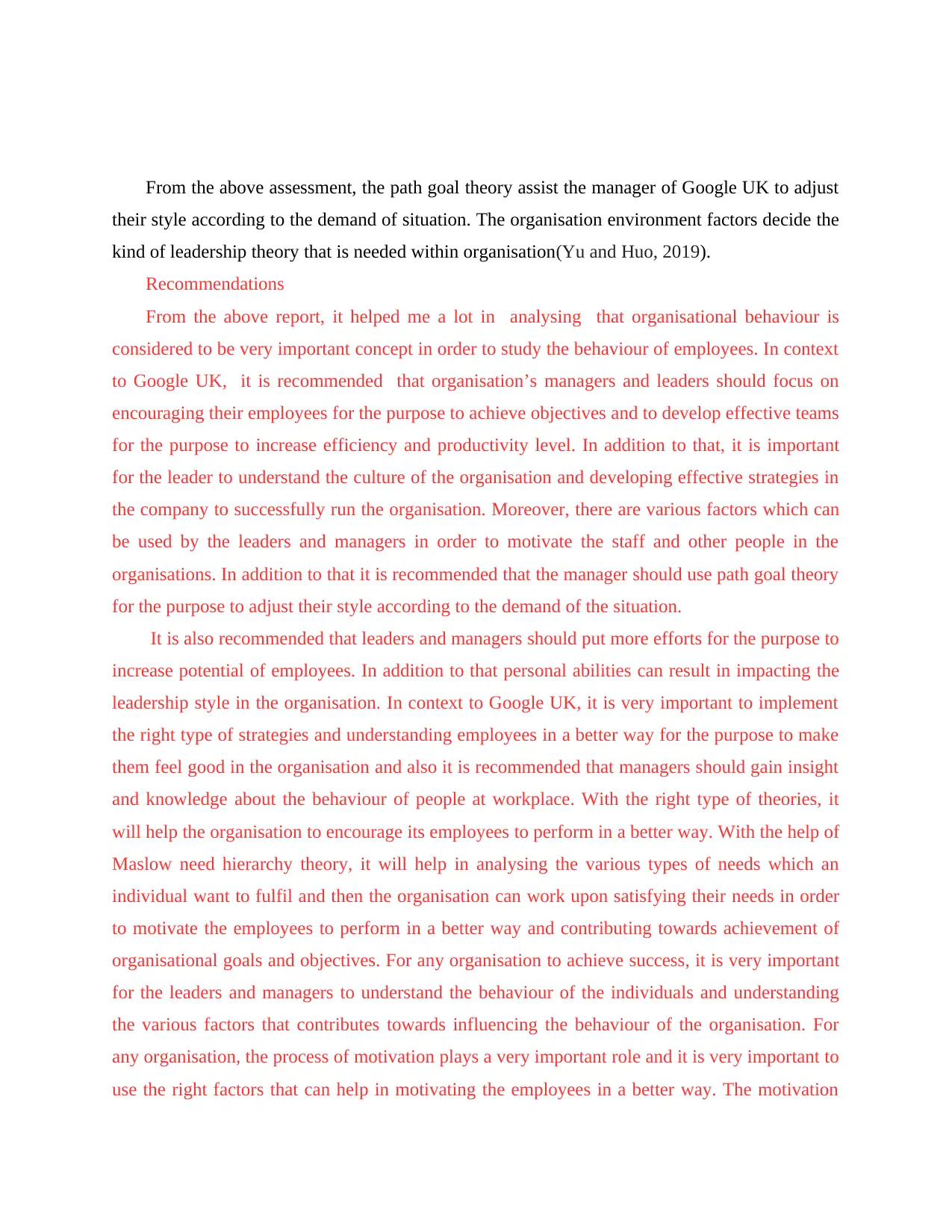
From the above assessment, the path goal theory assist the manager of Google UK to adjust
their style according to the demand of situation. The organisation environment factors decide the
kind of leadership theory that is needed within organisation(Yu and Huo, 2019).
Recommendations
From the above report, it helped me a lot in analysing that organisational behaviour is
considered to be very important concept in order to study the behaviour of employees. In context
to Google UK, it is recommended that organisation’s managers and leaders should focus on
encouraging their employees for the purpose to achieve objectives and to develop effective teams
for the purpose to increase efficiency and productivity level. In addition to that, it is important
for the leader to understand the culture of the organisation and developing effective strategies in
the company to successfully run the organisation. Moreover, there are various factors which can
be used by the leaders and managers in order to motivate the staff and other people in the
organisations. In addition to that it is recommended that the manager should use path goal theory
for the purpose to adjust their style according to the demand of the situation.
It is also recommended that leaders and managers should put more efforts for the purpose to
increase potential of employees. In addition to that personal abilities can result in impacting the
leadership style in the organisation. In context to Google UK, it is very important to implement
the right type of strategies and understanding employees in a better way for the purpose to make
them feel good in the organisation and also it is recommended that managers should gain insight
and knowledge about the behaviour of people at workplace. With the right type of theories, it
will help the organisation to encourage its employees to perform in a better way. With the help of
Maslow need hierarchy theory, it will help in analysing the various types of needs which an
individual want to fulfil and then the organisation can work upon satisfying their needs in order
to motivate the employees to perform in a better way and contributing towards achievement of
organisational goals and objectives. For any organisation to achieve success, it is very important
for the leaders and managers to understand the behaviour of the individuals and understanding
the various factors that contributes towards influencing the behaviour of the organisation. For
any organisation, the process of motivation plays a very important role and it is very important to
use the right factors that can help in motivating the employees in a better way. The motivation
their style according to the demand of situation. The organisation environment factors decide the
kind of leadership theory that is needed within organisation(Yu and Huo, 2019).
Recommendations
From the above report, it helped me a lot in analysing that organisational behaviour is
considered to be very important concept in order to study the behaviour of employees. In context
to Google UK, it is recommended that organisation’s managers and leaders should focus on
encouraging their employees for the purpose to achieve objectives and to develop effective teams
for the purpose to increase efficiency and productivity level. In addition to that, it is important
for the leader to understand the culture of the organisation and developing effective strategies in
the company to successfully run the organisation. Moreover, there are various factors which can
be used by the leaders and managers in order to motivate the staff and other people in the
organisations. In addition to that it is recommended that the manager should use path goal theory
for the purpose to adjust their style according to the demand of the situation.
It is also recommended that leaders and managers should put more efforts for the purpose to
increase potential of employees. In addition to that personal abilities can result in impacting the
leadership style in the organisation. In context to Google UK, it is very important to implement
the right type of strategies and understanding employees in a better way for the purpose to make
them feel good in the organisation and also it is recommended that managers should gain insight
and knowledge about the behaviour of people at workplace. With the right type of theories, it
will help the organisation to encourage its employees to perform in a better way. With the help of
Maslow need hierarchy theory, it will help in analysing the various types of needs which an
individual want to fulfil and then the organisation can work upon satisfying their needs in order
to motivate the employees to perform in a better way and contributing towards achievement of
organisational goals and objectives. For any organisation to achieve success, it is very important
for the leaders and managers to understand the behaviour of the individuals and understanding
the various factors that contributes towards influencing the behaviour of the organisation. For
any organisation, the process of motivation plays a very important role and it is very important to
use the right factors that can help in motivating the employees in a better way. The motivation
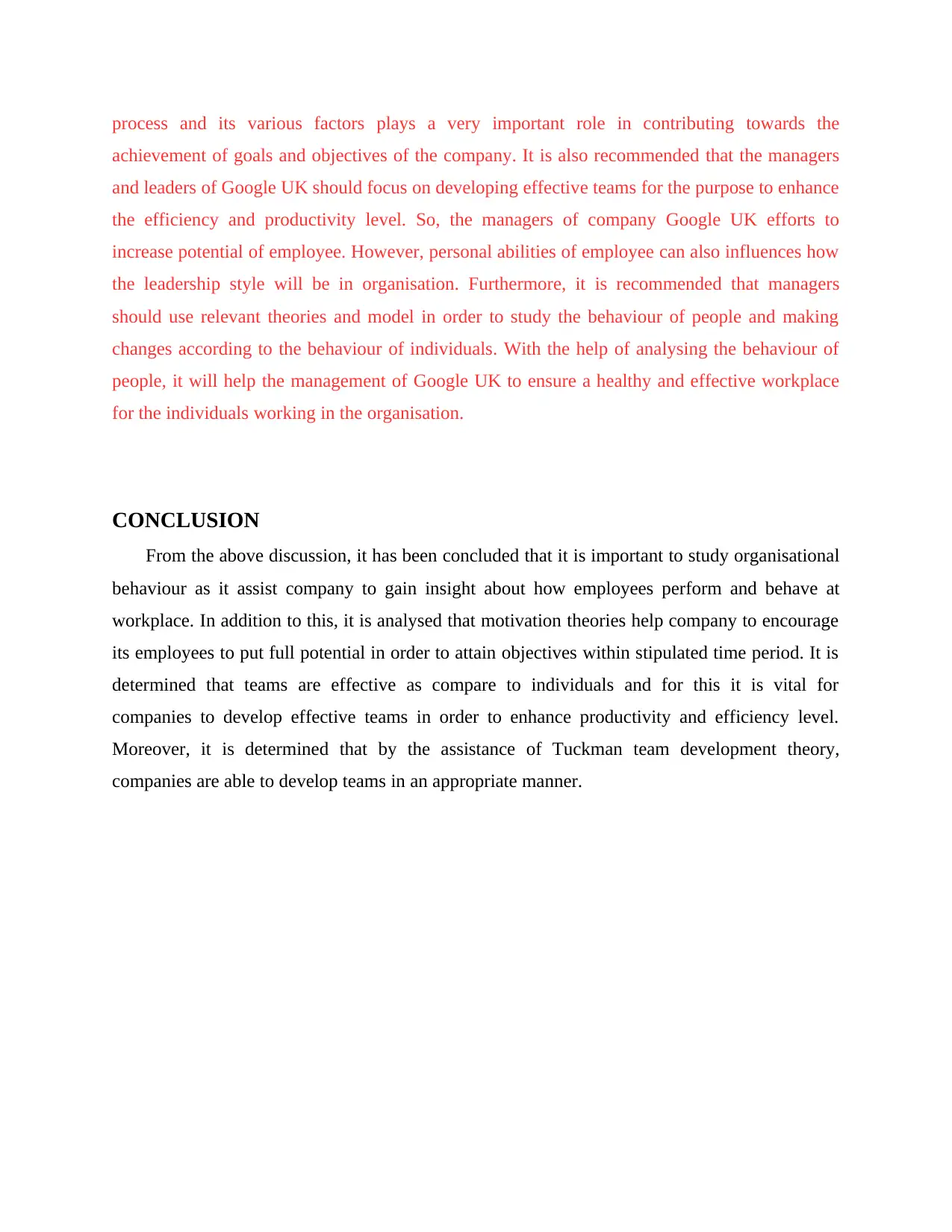
process and its various factors plays a very important role in contributing towards the
achievement of goals and objectives of the company. It is also recommended that the managers
and leaders of Google UK should focus on developing effective teams for the purpose to enhance
the efficiency and productivity level. So, the managers of company Google UK efforts to
increase potential of employee. However, personal abilities of employee can also influences how
the leadership style will be in organisation. Furthermore, it is recommended that managers
should use relevant theories and model in order to study the behaviour of people and making
changes according to the behaviour of individuals. With the help of analysing the behaviour of
people, it will help the management of Google UK to ensure a healthy and effective workplace
for the individuals working in the organisation.
CONCLUSION
From the above discussion, it has been concluded that it is important to study organisational
behaviour as it assist company to gain insight about how employees perform and behave at
workplace. In addition to this, it is analysed that motivation theories help company to encourage
its employees to put full potential in order to attain objectives within stipulated time period. It is
determined that teams are effective as compare to individuals and for this it is vital for
companies to develop effective teams in order to enhance productivity and efficiency level.
Moreover, it is determined that by the assistance of Tuckman team development theory,
companies are able to develop teams in an appropriate manner.
achievement of goals and objectives of the company. It is also recommended that the managers
and leaders of Google UK should focus on developing effective teams for the purpose to enhance
the efficiency and productivity level. So, the managers of company Google UK efforts to
increase potential of employee. However, personal abilities of employee can also influences how
the leadership style will be in organisation. Furthermore, it is recommended that managers
should use relevant theories and model in order to study the behaviour of people and making
changes according to the behaviour of individuals. With the help of analysing the behaviour of
people, it will help the management of Google UK to ensure a healthy and effective workplace
for the individuals working in the organisation.
CONCLUSION
From the above discussion, it has been concluded that it is important to study organisational
behaviour as it assist company to gain insight about how employees perform and behave at
workplace. In addition to this, it is analysed that motivation theories help company to encourage
its employees to put full potential in order to attain objectives within stipulated time period. It is
determined that teams are effective as compare to individuals and for this it is vital for
companies to develop effective teams in order to enhance productivity and efficiency level.
Moreover, it is determined that by the assistance of Tuckman team development theory,
companies are able to develop teams in an appropriate manner.
⊘ This is a preview!⊘
Do you want full access?
Subscribe today to unlock all pages.

Trusted by 1+ million students worldwide
1 out of 14
Related Documents
Your All-in-One AI-Powered Toolkit for Academic Success.
+13062052269
info@desklib.com
Available 24*7 on WhatsApp / Email
![[object Object]](/_next/static/media/star-bottom.7253800d.svg)
Unlock your academic potential
Copyright © 2020–2026 A2Z Services. All Rights Reserved. Developed and managed by ZUCOL.




